|
June 29, 2019 - No. 24
152nd
Anniversary of
Confederation
All Out to Give
Canada a Modern
Constitution and Definition of Rights
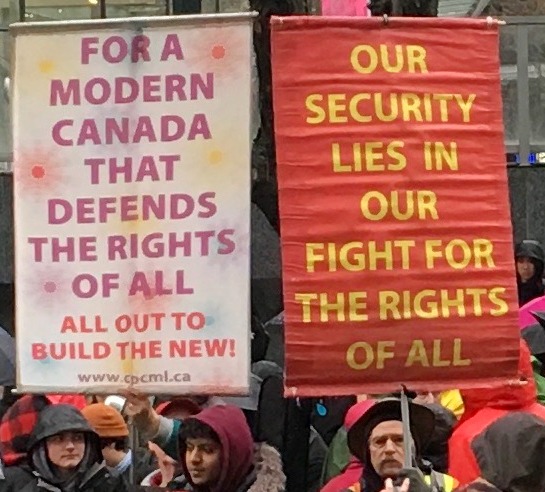 
July 1 marks the 152nd
anniversary of Confederation. On
this date in 1867, the British North America Act, 1867
united four separate colonies of the British Empire in North
America into the Dominion of Canada. The Indigenous nations and
peoples were made subject to the racist colonial Indian
Act and subjected to genocide on a grand scale while the
Métis
people were also treated on a racist basis and the Métis Nation
was ignored. The right of the Quebec nation to self-determination
was negated and the Québécois were also targeted for
attack. The
self-governing state and institutions imposed by the British
reaped them great benefits. Besides profiting from the plunder of
its resources, Canada paid the bill for the defence of the
British empire in both money and manpower which was used as cannon
fodder.
The British monarch was made the head of state and remains so to
this day. It is not a titular position only. By virtue of the
British arrangements which Canada inherited, an artificial person
of state is created in which sovereignty -- the decision-making
power -- is vested. Governments are elected which are said to be
representative of the wishes of the electors but they in fact
govern in the name of the sovereign which, as the person of
state, exists above them and is said to represent the national
interest. The parliamentary website says:
"The Crown plays a key role in Canada’s parliamentary system of
government. All executive authority is understood to derive from the
Sovereign, who is Canada’s formal head of state. The state is embodied
in the Sovereign; therefore every one of Canada’s Members of Parliament
is required to swear allegiance to the Queen. This is also why the
state, in Canada, is often referred to simply as 'the Crown.'"
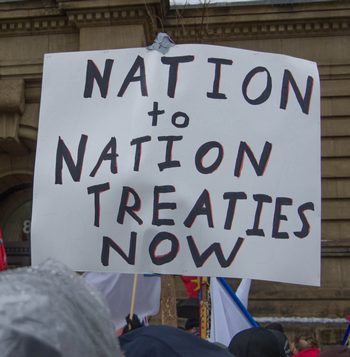 The British North
America Act, 1867 remains the
constitutional framework for Canada despite all the changes which
have come about since that time, be it Canada gaining its formal
independence, the extension of the franchise and distribution of
privileges among the elite from time to time, the development of
a socialized industrial base, and a powerful, educated working
class hailing from every corner of the world taking its place
across the land. The British North
America Act, 1867 remains the
constitutional framework for Canada despite all the changes which
have come about since that time, be it Canada gaining its formal
independence, the extension of the franchise and distribution of
privileges among the elite from time to time, the development of
a socialized industrial base, and a powerful, educated working
class hailing from every corner of the world taking its place
across the land.
This itself requires serious thought. After more than
150 years, two world wars and the end of the bipolar division of the
world, the Constitution and the definition of rights flowing from it
need to be brought on par with the needs of the times. Far from
recognizing this, the Trudeau Liberal government launched a program on
the occasion of the 150th anniversary of Confederation in 2017 to
"celebrate our common values, our achievements, our majestic
environment and our place in the world." This program promotes a
neo-liberal agenda at home and abroad and has led to the further
integration of Canada into the U.S. war machine. The government's
programs to promote "diversity and inclusion, reconciliation with
Indigenous peoples, environment and youth" have been shown in practice
to be meaningless or a self-serving means of using high ideals to cover
up an anti-social agenda. This year, a grand party is being organized
on the same day the so-called pre-election period begins. It is all
about promoting what the Liberal government sees as its achievements in
the last four years in office for purposes of getting re-elected. It is
all done in a manner which suggests that those who espouse a different
vision do not share Canadians' "common values." Meanwhile the
Conservatives and other parties which form the cartel party system will
complain about the Trudeau Liberals' access to the Canada Day platforms
for self-serving purposes.
 The Communist Party of
Canada (Marxist-Leninist) takes this
occasion to promote its work for democratic renewal. It calls for
the modernization of the Constitution based on the principle that
rights belong to us by virtue of being human and the need for a
free and equal union between Quebec, the Indigenous nations and
the rest of Canada. The Communist Party of
Canada (Marxist-Leninist) takes this
occasion to promote its work for democratic renewal. It calls for
the modernization of the Constitution based on the principle that
rights belong to us by virtue of being human and the need for a
free and equal union between Quebec, the Indigenous nations and
the rest of Canada.
CPC(M-L) emphasizes that this is an historic task, not a
matter of a policy choice. It is required so that the working
people who produce all the wealth can take the centre stage of
history and carry out the changes required to overcome the
problems facing the society in the spheres of the economy and the
natural and social environment.
To be kept informed about the activities and writings of
CPC(M-L) in the coming year, email office@cpcml.ca.

For Your
Information
A Modern Constitution for Canada
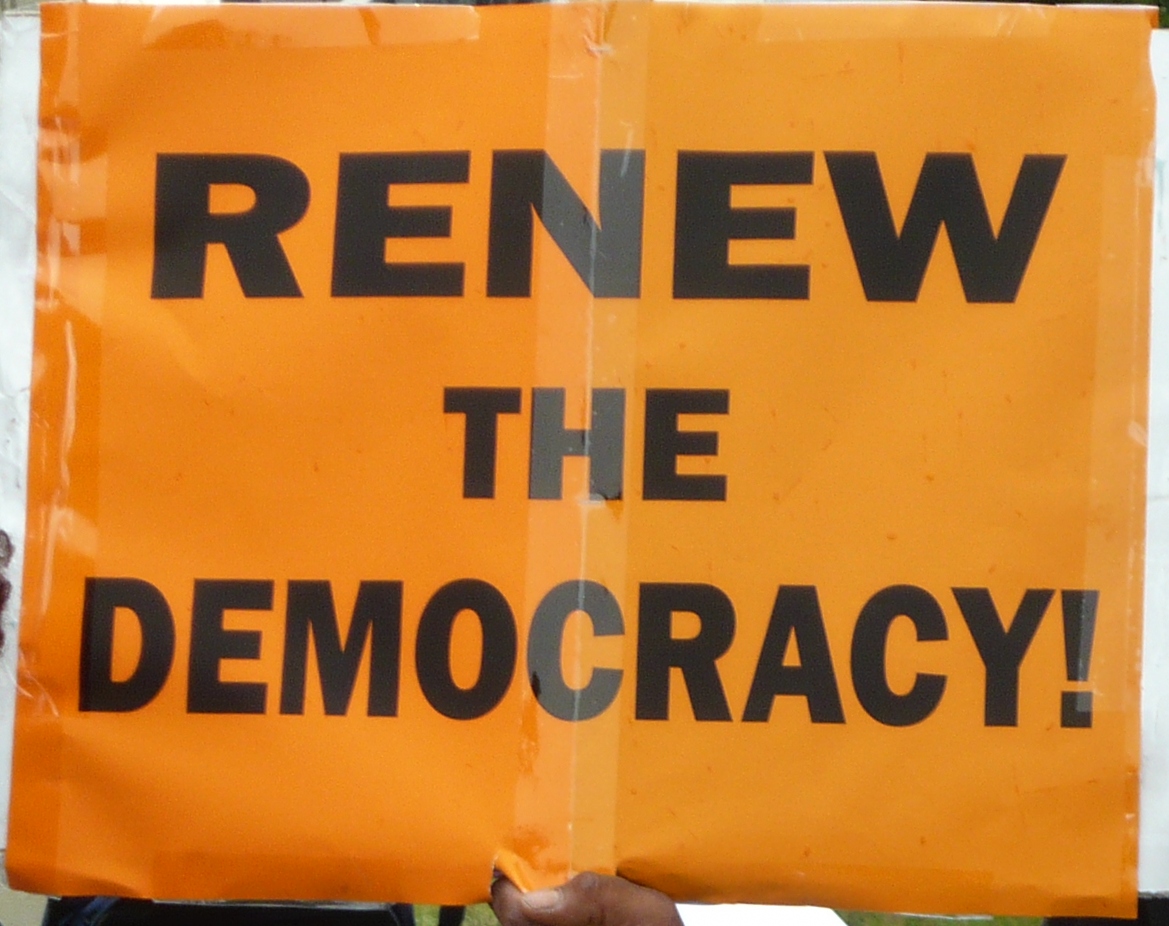 A modern constitution for
Canada must end the colonial
injustice suffocating the Indigenous peoples and implement the
principles of nation-to-nation relations. It must recognize
Quebec's right to self-determination, provide guarantees for
citizens and residents of the rights they possess by virtue of
being human, and set the stage for the democratic renewal of the
political process so that the peoples of Canada can directly
decide the matters that concern them and affect their lives and
the lives of peoples in other parts of the world affected by
Canada's foreign policy. A modern constitution for
Canada must end the colonial
injustice suffocating the Indigenous peoples and implement the
principles of nation-to-nation relations. It must recognize
Quebec's right to self-determination, provide guarantees for
citizens and residents of the rights they possess by virtue of
being human, and set the stage for the democratic renewal of the
political process so that the peoples of Canada can directly
decide the matters that concern them and affect their lives and
the lives of peoples in other parts of the world affected by
Canada's foreign policy.
History calls on the peoples of Canada and Quebec and
the
Indigenous peoples to establish modern arrangements amongst
themselves based on a free and equal union of sovereign entities.
On this basis they can face the challenges of the 21st century
with the people recognized as sovereign and in control over
decision-making, the institutions of the state and the direction
of the country.
Where Sovereignty Is Vested
The Constitution of Canada based on the 19th century
arrangement of the British North America Act
(BNA Act) still considers the
Queen of England the sovereign of
Canada and its head of state. The document A Consolidation of
the Constitution Acts 1867 to 1982 provided by the Department
of Justice stipulates, "The Executive Government and Authority of
and over Canada is hereby declared to continue and be vested in
the Queen." When the BNA Act, an act of the British
Parliament was patriated to Canada in 1982, then-Prime Minister
of Canada Pierre Trudeau, along with the provincial premiers, did
not see fit to remove this anachronism from the fundamental law
of the land. Again, during the talks that led to the Meech Lake
Accord of 1987 and in the report on the consensus between the
Prime Minister and 10 Premiers that led to the Charlottetown
Accord of 1992, no recommendation was made to repeal this
clause.
A change from sovereignty residing in the monarch to
sovereignty residing in the people is not a minor one but a
radical departure from the rule of the few in their narrow
interests over the many, to the rule of the many in the broad
public interest. It is not possible to have a modern constitution
consistent with the aspirations and demands of the people at this
time in history without a clear affirmation and definition that
the people are sovereign. The sovereign power sanctions
everything fundamental in terms of the law of the land and
everything that emanates from it.
This anachronism has not been removed because the
sovereign
power of the state has been transferred to the Prime Minister and
Premiers as Queen in Parliament, the Legislatures and National
Assembly of Quebec. Keeping the Queen of England as the formal
titular head of state allows the ruling elite to hide this fact.
The authority of the prime minister and premiers is absolute in
the English tradition of concentrating power in the
Crown-in-Parliament.
When the Prime Minister or Premiers say they have a
mandate to
rule for an allotted time frame, legally the Canadian
Constitution allows them to do so in an absolutist manner within
the separation of the federal and provincial powers. Were the
Constitution to declare that sovereignty resides with the
Canadian people, then it would have to stipulate the rights and
duties the people grant their governments, and how the
governments are to be chosen by and accountable to the people. A
change in this regard would necessarily mean recognizing and
establishing in law that the people are sovereign and creating
the legal means to enable them to be so. This formidable
epoch-changing modernization of the Constitution is not something
the present ruling elite and their cartel political parties are
either willing to accomplish or capable of doing.
A democracy that does not provide the citizens of the
country
with the means to exercise control over the policies and
decisions of the elected bodies according to the fundamental law
they themselves have enacted, is a form of authoritarian and
absolutist rule.
The constitutional arrangements of the last more than
150
years have never vested sovereignty in the people. On the
contrary, Confederation in 1867 was a power-sharing arrangement
between Britain and the local ruling elite and concerned itself
mainly with the division of powers between the central government
and the provinces. The promise to submit the agreement that
united four provinces into a dominion for the people's approval
was quickly abandoned when it became clear that it would have
been rejected. Neither the 1982 patriation of the Constitution
and addition of a Charter of Rights and Freedoms nor any
of the changes made since have overcome the fact that the
Constitution of Canada does not emanate from the people and that
Confederation did not permit a free and equal union of sovereign
peoples.
Quebec Is Said to Be One of Two "Founding Nations" of
Canada
But Is Not a Signatory to the Constitution
Act of 1982
Quebec is not a signatory to the Constitution Act of 1982 as a
result of the obstinate refusal of the ruling elite to recognize its
right to self-determination. Attempts to sort out Quebec's place in
Confederation have failed time and again because all have sought to
maintain the anachronistic Anglo-Canadian state arrangements which
refuse to recognize Quebec's sovereignty.
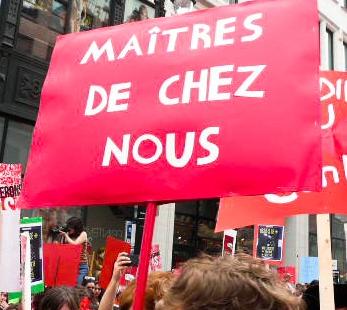 One of the main obstacles
to the resolution of the place
of
Quebec in or out of Confederation, and a practical means used to
deprive the people of Quebec of their rights over this entire
period, is the following: from the outset, the aspirations of the
people to take control of decision-making has been eclipsed by
the imposition of divisions based on considerations of origin,
language or religion. It began with the Durham Report of 1839,
which declared that the problem in Canada was the emergence of a
"mortal hatred" between "two races, the French and the
English." One of the main obstacles
to the resolution of the place
of
Quebec in or out of Confederation, and a practical means used to
deprive the people of Quebec of their rights over this entire
period, is the following: from the outset, the aspirations of the
people to take control of decision-making has been eclipsed by
the imposition of divisions based on considerations of origin,
language or religion. It began with the Durham Report of 1839,
which declared that the problem in Canada was the emergence of a
"mortal hatred" between "two races, the French and the
English."
Durham's assertion was a deliberately false
representation of
what had taken place during the Rebellion of 1837-1838 against
British rule in Lower Canada. It was an application of the famous
British empire-building strategy of divide and rule. The same was
done a few years later in India. The British empire-builders
proclaimed that the problem in India was that the Muslims and
Hindus hated each other. In actual fact Indians of all origins
and religions united against British rule in the War of
Independence of 1857. The big lie of hatred amongst the people
permitted the British colonialists to present themselves as the
peacemakers and spread the empire-builders' doctrine of
tolerance. Justin Trudeau invokes tolerance in a similar manner
today. This kind of thing stigmatizes anyone who contests the
present constitutional arrangements as intolerant and
backward.
To ensure that the Canadian colonies were seized by
resentments based on ethnic and language differences, the Durham
Report openly recommended the assimilation of French Canadians,
whom it called "a people with no literature and no history." From
this self-serving and anti-people perspective, the British
empire-builders imposed a legislative union of Upper and Lower
Canada and a factional system of party government. This set the
stage for institutionalized politics of fomenting antagonisms
amongst the people and dividing them along party lines, based
on their alleged values.
The Liberal Party of today is born out of a division of
the
Parti Rouge created by the Patriots to pursue their cause
following the crushing of the Rebellions of 1837-38. Some in the
Parti Rouge were enticed into the politics of division while
those who opposed the division and persisted in upholding the
republican ideas of the Patriots were persecuted, isolated,
imprisoned, hung, left stranded, ostracized and ex-communicated
by the Church, their writings forbidden to be distributed and
read. The champions of the politics of division went on to create
the Liberal Party of Canada following Confederation.
 The fight for a republic in
Lower Canada against the
undemocratic rule of the colonial power and its local ruling
elite -- the Chateau Clique -- comprised of rich and powerful
merchants, had united all democratic-minded people, whatever their
origin. Their struggle was accompanied by a similar uprising in
Upper Canada, led by William Lyon Mackenzie and directed against the
privileges and stranglehold of the ruling clique there, called the
Family Compact. The fight for a republic in
Lower Canada against the
undemocratic rule of the colonial power and its local ruling
elite -- the Chateau Clique -- comprised of rich and powerful
merchants, had united all democratic-minded people, whatever their
origin. Their struggle was accompanied by a similar uprising in
Upper Canada, led by William Lyon Mackenzie and directed against the
privileges and stranglehold of the ruling clique there, called the
Family Compact.
The politics of division has been used ever since to
weigh down the people of Quebec and act as an instrument of oppression
of the Quebec nation, with adherents both inside and outside Quebec and
even inside and outside the nationalist movement. The motion adopted in
2006 by the government of Stephen Harper "recognizing the nation of
Quebec" asserts: "This House recognizes that the
Québécois form a nation within a united Canada." The
motion confines the nation of Quebec to an ethnic group whose language
is French. The motion does not include people who speak other languages
and who are of other origins as part of the nation of Quebec. Nor does
it uphold nation-to-nation relations with the Indigenous peoples whose
unceded territories have been inhabited. The motion introduces a
diffuse notion of Québécois without a defined territory,
one comprising separated communities across Canada of French Canadian
descent. In this convoluted framework, the "nation of Quebec" can never
be conceived as sovereign and having the right to self-determination up
to and including the right to secede from Canada. As in any marriage,
only a free and equal union can hope to flourish.
To confine the notion of Quebec to an ethnic group of
Québécois was also the strategy used by Pierre Elliott
Trudeau to
deny the existence of the nation of Quebec and the people of
Quebec their national rights. In the 1960s, Pierre Trudeau
proclaimed nationalism to be "backward" and an enemy of the
modern state, on which he imposed his own self-serving irrational
definition of a nation. He claimed the nation of Quebec did not
exist but was simply a large ethnic group within Canada.
"Biculturalism" was introduced as the official policy of the
Canadian state as a means to circumvent and undermine the demands
and aspirations of the nation of Quebec and Indigenous nations
and to weaken the unity of all the peoples of Canada and Quebec
and of Indigenous descent and their demand for new arrangements
capable of resisting the empire-building of U.S. imperialism.
After the October 2015 federal election, Justin Trudeau
applied a similar conceit to Canada saying, "There is no core
identity, no mainstream in Canada. There are shared values --
openness, respect, compassion, willingness to work hard, to be
there for each other, to search for equality and justice."
As concerns Quebec, Justin Trudeau has said on several
occasions that "nationalism is an old idea from the 19th century" and
is based on "a smallness of thought." He further claims that Canada is
"the first postnational state." This desire of Trudeau the younger that
Canada be a "postnational state" can be set within the perspective of
Trudeau the elder's assertions of "backward nationalism" in the 1960s
and 1970s and his prejudice equating nationalism with small-mindedness.
The attack of father and son Trudeau on what they call narrow-minded
nationalism boils down to an attack on the right of the people to build
their decision-making power at their level against the concentration of
power in the hands of the privileged few which is today exercised on a
supranational level within the neo-liberal global economy. The fight to
affirm this right extends from the rebellion against colonial control
and the iron grip of the rich merchants of the Chateau Clique in the
19th century to the striving to end the power of the supranational
powerful economic global monopolies and oligopolies of today and their
military arms, such as NATO.
The people face an obstinate refusal to recognize
Quebec's
right to self-determination and the people's right to be and to
govern themselves with modern institutions, and the sowing
of divisions of all kinds. The ruling elite are incapable of
providing Canada with a modern perspective of a free and equal
union of the peoples of Canada, Quebec and Indigenous peoples. In
the Canadian federalism based on liberal notions of
empire-building, people are subjects and the sovereign power
resides in the monarch, which today is a front for the
concentration of power in the hands of the Prime Minister's
Office acting on behalf of the most powerful monopolies centred
in the U.S.-led imperialist system of states.
The Necessity to End Colonial Injustice and Negation of
Rights and to Establish Nation-to-Nation Relations with the
Indigenous Peoples
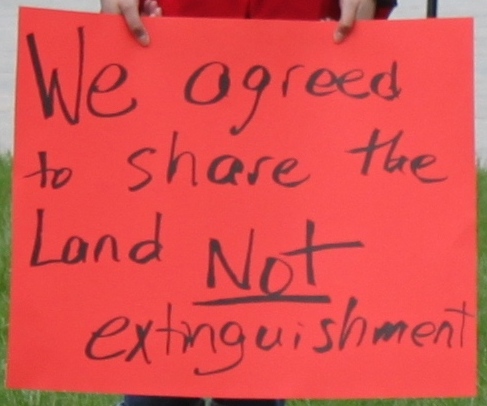 The Canadian Constitution
does not recognize the
inherent
hereditary rights and treaty rights of the Indigenous peoples and
the sovereignty of their nations. The hereditary rights of the
Indigenous peoples are their rights to be and live on their
traditional territories according to what their own thought
material teaches them, how they define their needs and what they
require in the 21st century to concretize their rights and give
them full expression. The colonial invasion attempted to negate
the hereditary and other rights and development of the peoples
who have inhabited Turtle Island, Abya Yala and other territories
of the Americas since time immemorial. This negation of rights
must be negated if justice is to prevail and nation-to-nation
relations are to be established in practice, allowing the Indigenous
peoples to flourish. The Canadian Constitution
does not recognize the
inherent
hereditary rights and treaty rights of the Indigenous peoples and
the sovereignty of their nations. The hereditary rights of the
Indigenous peoples are their rights to be and live on their
traditional territories according to what their own thought
material teaches them, how they define their needs and what they
require in the 21st century to concretize their rights and give
them full expression. The colonial invasion attempted to negate
the hereditary and other rights and development of the peoples
who have inhabited Turtle Island, Abya Yala and other territories
of the Americas since time immemorial. This negation of rights
must be negated if justice is to prevail and nation-to-nation
relations are to be established in practice, allowing the Indigenous
peoples to flourish.
The Constitution does not recognize the fiduciary
obligations
of Canada as a country that was built through the colonial
seizure, occupation and exploitation of Indigenous lands and
labour and the genocidal attempt to wipe them out as peoples. The
fiduciary obligations must ensure that the highest standard of
living is guaranteed to the Indigenous peoples and that all
services are provided to them at the highest possible level.
Renewing on a modern basis the relationships amongst sovereign
Indigenous nations, sovereign Quebec and sovereign Canada -- the
sovereign peoples as individuals and collectives -- is critical
to the renewal of Confederation and the modernization of the
conditions of life itself.
The policies of the Liberal government and the denial of
the
Conservatives in the Opposition, both of whom are contending to
form the next government, are as unprincipled as they are
pragmatic. Justin Trudeau's senior Assistant Deputy Minister for
Treaties and Aboriginal Government Joe Wild, in discussing ways to
"breathe new life" into the Canadian Constitution regarding
Canada's relations with First Nations and their sovereignty,
said, "There is a notion of sovereignty that can still exist in a
way that doesn't threaten the fabric of the nation. There may be
a few areas where you've got to be a little bit careful, like
raising an army, the border of the country versus other
countries, but the rest of it? You could probably figure out ways
in which it kind of works out and it doesn't actually do anything
that would threaten the standing of Canada as Canada."[1] Wild also said his
government will
deal with each Indigenous community or nation as a separate
entity to try to reach an agreement with each one of them.
 Wild's comments indicate
the continuation of an
oppressive
colonial relation which today the Trudeau government reiterates
when it says it will carry on making decisions that affect the
lives of Indigenous peoples without their consent. The fight of
Indigenous peoples for
sovereignty on their lands and in all decision-making does not
have to answer to a greater power that decides for them and
claims that it represents the fabric of the nation. Sovereignty
means that the Indigenous peoples decide and their relations with
Canada are relations between sovereign entities with the modern
relationship enshrined in the Constitution. The renewal of the
Constitution must eliminate any vestige of colonial relations and
the catch-phrases such as "collaborative approach" etc, which
mean in practice the continuation of the status quo. Wild's comments indicate
the continuation of an
oppressive
colonial relation which today the Trudeau government reiterates
when it says it will carry on making decisions that affect the
lives of Indigenous peoples without their consent. The fight of
Indigenous peoples for
sovereignty on their lands and in all decision-making does not
have to answer to a greater power that decides for them and
claims that it represents the fabric of the nation. Sovereignty
means that the Indigenous peoples decide and their relations with
Canada are relations between sovereign entities with the modern
relationship enshrined in the Constitution. The renewal of the
Constitution must eliminate any vestige of colonial relations and
the catch-phrases such as "collaborative approach" etc, which
mean in practice the continuation of the status quo.
The demand for a modern constitution is yet another
struggle
bringing Indigenous, Canadian and Quebec peoples into closer
united action for their rights. The struggle of all the peoples
is at heart one fight -- the fight for political and
constitutional renewal so that the rights of all can be
guaranteed in a modern constitution that recognizes, upholds and
guarantees the rights of all. The 19th century colonial racist
Canadian state and its retrogressive Constitution are blocking
the forward movement of society for which all the peoples as
individuals and collectives aspire.
The time is now for women and youth, together with all
the
working people and their allies in other strata and classes
across Canada and Quebec to work together with the Indigenous
peoples for a profound renewal of the political arrangements in
the society and to deprive the authorities of their power to
deprive the people of their rights. The peoples themselves must
be empowered to take control of their economic, political and
social affairs. Constitutional and political renewal is a
precondition for true reconciliation amongst the Indigenous
peoples, Canada and Quebec.
The Constitution of 1982 Does Not Provide the Rights of
Citizens and Residents with a Guarantee
The recent history of Canada has witnessed an all-sided
offensive against the rights and freedoms of citizens and
residents in the name of "national security," the "fight against
terror" and "economic prosperity." In the upcoming election, in the
name of alleged "hybrid warfare" of
foreign powers against the Canadian elections, rights are negated. In
the name of
protecting the democracy, freedom of speech is allowed so long as
the political police say it is not damaging, based on criteria
they claim protects the national interest. The principle that
people have rights by virtue of being human under all conditions
and that the state is obligated to guarantee those rights does not
guide government action. The buyout of the Trans Mountain
Corporation and approval of the Trans Mountain Pipeline expansion
was done using the prerogative powers of the government,
overriding serious environmental concerns and the lack of consent
of many Indigenous peoples.
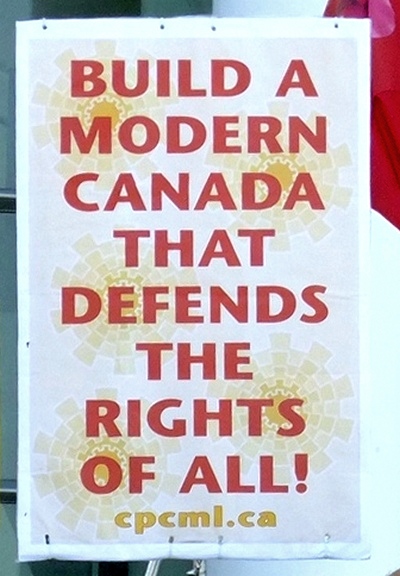 The Canadian Charter of
Rights and Freedoms was
incorporated into the patriated Constitution in 1982. The Charter
contains the provision of "reasonable limits [on rights and
freedoms] prescribed by law as can be demonstrably justified in a
free and democratic society." The Charter
has fallen into crisis
and disrepute as "reasonable limits" have been overtaken by the
arbitrary powers of the state known as police powers, which
dictate those rights the people may or may not have, just as they were
dictated by Lord
Durham, representing the colonial police power, in the
19th century. This has resulted in an endless arbitrary process
of criminalization of conscience and attacks against the
struggles of the people who oppose the anti-social offensive and
the agenda of war and regime change of the ruling elite on the
side of the U.S. imperialists and U.S.-led NATO. The Canadian Charter of
Rights and Freedoms was
incorporated into the patriated Constitution in 1982. The Charter
contains the provision of "reasonable limits [on rights and
freedoms] prescribed by law as can be demonstrably justified in a
free and democratic society." The Charter
has fallen into crisis
and disrepute as "reasonable limits" have been overtaken by the
arbitrary powers of the state known as police powers, which
dictate those rights the people may or may not have, just as they were
dictated by Lord
Durham, representing the colonial police power, in the
19th century. This has resulted in an endless arbitrary process
of criminalization of conscience and attacks against the
struggles of the people who oppose the anti-social offensive and
the agenda of war and regime change of the ruling elite on the
side of the U.S. imperialists and U.S.-led NATO.
Attacks on rights under the hoax of exceptional
circumstances
have become the norm, while communities, such as the Muslim
community, are profiled and targeted with a vengeance and without
a right to recourse. The absence of a constitution that
prescribes inalienable rights and makes them enforceable and
justiciable is acutely felt all across the country.
Furthermore, the arrangements at the base of
Confederation are
being destroyed as governments at all levels, whether federal,
provincial or municipal, have been taken over by narrow global
private interests. They have become instruments of decisions made
on a supranational basis, be that of the G7, G20, IMF, NATO or
others.
The ruling elite no longer consider the old arrangements
of
power-sharing between the federal and provincial governments
useful for the drive of the most powerful global interests. They
do not recognize any jurisdiction or limitation on their monopoly
right and striving for domination on a world scale. The
contradictions over federal/provincial power-sharing agreements
have degenerated into dogfights amongst governments serving
definite global monopoly interests. This can be readily seen in
the fight over such things as the Carbon Tax and pipelines,
health care transfer payments, monies for infrastructure spending
and many other issues.
During the past year, the Prime Minister's Office and
certain
high level government operatives were caught interfering in the
supposedly independent Judiciary on behalf of the global monopoly
SNC-Lavalin -- a corrupt act by any definition and one that
violated the famous separation of powers that supposedly
characterizes "rule of law" countries, which the Liberals never
tire of declaring that Canada is. They have shown themselves to be
serial violators of the rule of law internationally as well,
openly conspiring with the U.S. to destabilize and overthrow
governments targeted for regime change and, in the case of the
Bolivarian Republic of Venezuela, mete out collective punishment
to its population in the form of economic sanctions.
 The need to renew the
Constitution to vest sovereignty
in the
people and guarantee their rights as the basis of Canadian
sovereignty has never been greater. Political and constitutional
renewal, far from being outdated or what the ruling elite call "a
divisive issue," is central to opening the path to the progress
of society. In this regard, the working class and other social
classes and strata should seize the occasion of the anniversary
of Confederation to examine the evolution of the democratic
institutions in Canada, the interests they serve, in what
direction they are being taken and what needs to be done to give
form and content to the people's aspirations for sovereignty,
empowerment and enlightenment, and the right to decide and
control those political, economic and social affairs that affect
their lives. This initiative is most timely and necessary to
chart our destiny in a way that is beneficial to the people. The need to renew the
Constitution to vest sovereignty
in the
people and guarantee their rights as the basis of Canadian
sovereignty has never been greater. Political and constitutional
renewal, far from being outdated or what the ruling elite call "a
divisive issue," is central to opening the path to the progress
of society. In this regard, the working class and other social
classes and strata should seize the occasion of the anniversary
of Confederation to examine the evolution of the democratic
institutions in Canada, the interests they serve, in what
direction they are being taken and what needs to be done to give
form and content to the people's aspirations for sovereignty,
empowerment and enlightenment, and the right to decide and
control those political, economic and social affairs that affect
their lives. This initiative is most timely and necessary to
chart our destiny in a way that is beneficial to the people.
Constitutions and constitutional matters must not be a
monopoly of a ruling elite that use them for their own narrow
self-serving private interests. They belong to the people
fighting to defend their rights. Canadians want to enshrine and
codify in a constitution the modern definitions to which they
aspire and which are in conformity with the concrete conditions.
The fight to renew Confederation on a modern basis is an
instrument in the hands of the people to further the public
interest, open a path forward and block the arbitrariness,
backwardness, anarchy, violence and wars that the ruling elite
have unleashed.
Let us organize for a modern constitution and a free and
equal
union of sovereign peoples whose rights are recognized and
guaranteed.
Note
1. June 4, 2017.

PDF
PREVIOUS
ISSUES | HOME
Website: www.cpcml.ca
Email: editor@cpcml.ca
|

